Presenters' Biographies:
Paul Austerlitz | Tom Van Buren | Martha Ellen Davis | Judith Gray |
Jonathan Kertzer | Wayne Newell | Svanibor Pettan | Anthony Seeger |
Dan Sheehy | Kjell Skyllstad | Blanch Sockbasin | Nick Spitzer | Jeff Todd Titon
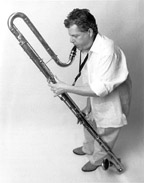
Paul Austerlitz, Assistant Professor of Music at Brown University
Paul Austerlitz's book Merengue: Dominican Music and Dominican Identity looks at popular music in relation to national and racial identity in the Dominican Republic and among Dominicans in the United States. Austerlitz has also conducted research on jazz and folk music in the country of his birth, Finland, and he is currently preparing a critical edition of music from the repertory of the Latin-jazz band Machito and his Afro-Cubans. His directions for future research involve consideration of music's ability to affect our minds and bodies, and its ability to effect changes in consciousness and health. In addition to his scholarly work, Austerlitz is active as a jazz musician and composer.
[ top ]

Tom Van Buren, Director of Field Research, Center for Traditional Music and Dance, New York, NY
The mission of the Center for Traditional Music and Dance is to support the practice and perpetuation of traditional, root and evolved performing arts in specific ethnic communities of New York through performance projects, publicity, fundraising and technical assistance. The Center collaborates with community artists, institutions, educators, community organizers, local business and media to achieve the general mission and to see that the programs reach a primarily community audience and have the best opportunity to become a viable, on-going presence in the cultural life of the communities.
[ top ]
Martha Ellen Davis, Affiliate Associate Professor, School of Music & Dept. of Anthropology at University of Florida, Gainesville
Martha Ellen Davis pioneered the institutionalization of applied ethnomusicology within the Society for Ethnomusicology. In 1998 she co-founded, with Doris J. Dyen, the Committee on Applied Ethnomusicology and shepherded it into becoming the Applied Ethnomusicology Section. In a special volume of Ethnomusicology, edited by Jeff Titon of Brown University in 1992, she also published the oft-cited article, "Careers, Alternative Careers‚ and the Unity between Theory and Practice in Ethnomusicology," which mentors ethnomusicologists-in-development with regard to professional options. For Davis, applied projects have at times been adjuncts of academic employment, and at other times her central activities and form of livelihood. For example, while a visiting professor in the Department of Music at Brown University in the 1980s, she served as anthropological and ethnomusicological advisor for a life history and theatre project with the Hispanic elderly of Providence. During the past year, while an affiliate professor at the University of Florida, Davis has done field research and written the bilingual text for an online museum exhibit, "South American Music in Miami: Colombian, Venezuelan, and Peruvian Traditions." She is currently directing documentary videos for the Ministry of Culture in the Dominican Republic. In September 2001, she did audiovisual documentation of traditional African-American farm technologies, crafts, music, and oral history for a community organization in the Florida Panhandle region, funded by the State of Florida’s Division of Cultural Affairs. She will launch 2003 by leading artists-in-the-schools presentations for the Florida Folklife Program. At the same time, in the academic arena, she has just been inducted into the Academy of Sciences of the Dominican Republic, which will contract her for scholarly publications based on her field work in the country.
[ top ]
Judith Gray, Archive of Folk Culture, American Folklife Center, Library of Congress
Judith Gray received her Ph.D. from Wesleyan University in ethnomusicology. She is now a coordinator of reference services at the Library of Congress' American Folklife Center. An ethnomusicologist, Ms. Gray has expertise in the earliest recordings of Native American music and contemporary cultural expressions. She has been with the Library since 1983.
[ top ]
Jonathan Kertzer, Director of Smithsonian Global Sound, Seattle, WA
Jonathan M. Kertzer is project director for Smithsonian Global Sound Network. He is the former director for media, multimedia, and online productions for the Experience Music Project (EMP). Previously, Kertzer was the music manager for the Multimedia/Consumer Division of the Microsoft Corporation. He worked with the music industry; educated artists, producers, and managers in the use of Microsoft tools and technology; and produced Win95enhanced CD music samplers and music titles for EMIBlue Note and BMG Classics. Kertzer has served as lead editorial manager and production supervisor for such Microsoft products as Encarta, Bookshelf, Cinemania, Musical Instruments, and Music Central. He has consulted for WOMADUSA, Smithsonian Folkways Recordings, and Artspages Europe. Kertzer has been a lecturer in music at the University of Washington as well as a festival producer, promotion manager, label manager, and radio show host. He has a B.A. from Brown University and a Masters in Music from the School of Oriental and African Studies, University of London, with a specialization in African and American popular music.
[ top ]
Wayne Newell, Director of Bilingual and Bicultural programs at Indian Township School, Princeton, ME
Wayne speaks the Passamaquoddy language fluently and utilizes English as his second language. Educated in local schools Wayne earned his M.A. in Education from Harvard University. In 1971, he directed the first bilingual/bicultural education program for the Passamaquoddy tribe. This program included the introduction of a writing system for the Passamaquoddy language which continues to be spoken by tribal members. As an integral part of the teaching curriculum, the program trained Passamaquoddy community members to actively participate in educating their children in the use of Passamaquoddy values and life philosophies. He also authored and co-authored over forty reading books written in the Passamaquoddy/Maliseet language.
Wayne has also been active in his Tribe's continuing struggles for justice for Native people. He has served on many of the Tribe's leadership positions, Tribal Council, Tribal Representatives, to the Maine Legislature, Member of the Maine Human Rights Commission and the Local Housing Authority. He currently holds a seat as the Tribe's representative to the Maine/Indian Tribal State Commission, a legislative body created to monitor the Maine Indian Claims Settlement Act of 1980. Wayne was also appointed by Jimmy Carter to serve on the National Indian Education Advisory Committee. He was a former member of the Native American Rights Fund. He currently serves as President of Northeastern Blueberry Co., a tribally owned business which grows wild blueberries and cranberries. He continues to work in Maine Indian Education on the creation of an indigenous model of a culturally integrated school curriculum for Native children.
Wayne's most prized position in life is being a father of four children and "grandpa" of ten wonderful grandchildren. Wayne is a story teller, singer of Passamaquoddy and other Native music. He serves as Master of Ceremonies during the Tribe's annual celebration which is always held during the second week in August at Sipauik (Pleasant Point) in eastern Maine.
[ top ]
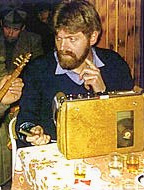
Svanibor Pettan, Professor, chair of Ethnomusicology program and of Center for Applied Ethnomusicology, Faculty of Arts of University of Ljubljana, Slovenia
Svanibor Pettan studied ethnomusicology in Croatia (B.A.), Slovenia (M.A.), and USA (Ph.D.). He researched music in his native Croatia, Slovenia, in the Balkans (particularly in Kosovo), Africa (Tanzania, Egypt), Australia, and USA. At the University of Oslo he became involved with applied ethnomusicology through the Bosnian-Norwegian project "Azra." His specialties include Balkan Gypsy music, multicultural music education, and music in relation to politics, war and exile.
In the last few years Pettan has focused on three main applied projects:
1. Azra was the Oslo-based project that brought together Bosnian refugee musicians and Norwegian music students. It was conceived on three mutually related levels: research, education, and musicmaking. Concerts of the ensemble Azra raised the awareness about the war in Bosnia and Herzegovina and funds for humanitarian purposes.
2. Where the Wild Things Are was the UK-based project that involved the Manor school in London and two elementary schools in eastern Croatia, which were exposed to the war at the time. Pupils established communication link by exchange of drawings and other materials and created the same performance based on Maurice Sendak's book Where the Wild Things Are. The same performance was created in cooperation between music students in Croatia and Slovenia and the respective refugee children in Zagreb and Ljubljana.
3. Kosovo Roma was a project meant to be put to life in Kosovo and containing photo exhibition, video documentary, CD-ROM and book. Its aim was to cast light on the integrationist role of Romani (Gypsy) musicians in Kosovo in the past — before they became silenced victims of the Albanian-Serbian conflict — in order to enable their cultural and physical survival. A specific view of Kosovo with focus on Romani musicians was meant to inform and sensitize primarily the Albanian majority population and international peace-keeping forces.
[ top ]
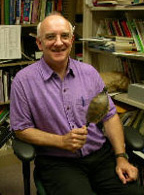
Anthony Seeger, Professor of Ethnomusicology at UCLA
Professor Seeger recently joined the faculty after serving as Curator of the Folkways Collection and Director of Smithsonian Folkways Recordings at the Smithsonian Institution from 1988 to 2000. Her served as Director of the Archive for Traditional Music at Indiana University and a professor in the Department of Anthropology at the Museu Nacional in Fio de Janiero, Brazil. His writings have focused on the Suya Indians of Brazil, issues of land and human rights for Brazilian Indians, issues of archiving and intellectual property, ethnomusicological theory and method, music and ethnicity, music and politics, and music education. His record of professional service includes serving as president of the International Council for Traditional Music from 1997 to the present and as president of the Society for Ethnomusicology from 1991 to 1993. He was Book Review Editor of the Yearbook for Traditional Music and on the Editorial Board of the University of Chicago Press Ethnomusicology Series. In 1987 he published Why Suya Sing: A Musical Anthropology of an Amazonian People (Cambridge University Press). Ph. D. in Anthropology, the University of Chicago; M.A., Social Sciences, the University of Chicago; B.A., Social Relations, Harvard University.
[ top ]

Dan Sheehy, Director of Smithsonian Folkways
Dr. Daniel Sheehy is the director of Smithsonian Folkways. He served as director for Folk and Traditional Arts at the National Endowment for the Arts from 1992 to 2000 and as assistant director from 1978 to 1992. Dr. Sheehy supervised the National Heritage Awards and a grants program providing approximately $4 million annually for projects in the folk and traditional arts across the United States. A Fulbright scholar, he earned his Ph.D. in ethnomusicology from UCLA. He served as co-editor of the recently released South America, Mexico, Central America, and the Caribbean volume of the Garland Encyclopedia of World Music.
[ top ]

Kjell Skyllstad, Professor, Department of Music and Theater, University of Oslo, Norway.
Professor Kjell Skyllsad teaches at the Department of Music and Theater in the University of Oslo. He has initiated research projects in the field of ethnic integration and conflict mediation through the arts for a number of years, including a project called Klangrikt Fellesskap for Rikskonsertene (1989-1992), which proved of great significance in determining the positive effect of interracial integration in schools through the medium of music and dance. This project has given rise to a number of similar projects in other countries, especially in Scandinavia, in the Balkans and in Israel. He has edited a report on these projects in a publication titled Musikk for barn og unge I det ferkilturelle samfuinn Skriftserie fra Institute for Musikk og Teater. By cooperating with fellow researchers from the former Yugoslavia he has also initiated an interactive project titled AZRA which works to bridge the gap between the Norwegian community and Bosnian refugees. This project was reported on in War, Exile, Everyday Life (Zagreb 1996) and other international publications. Recently he initiated a Multicultural Festival of Asian Music to be held in Colombo and Kandy, Sri Lanka, and was also the coordinator of a cooperative research project with Kelaniya University and Sri Lanka under the SUM/NUFU agreement. His most recent report is titled Creating a Culture of Peace Strategies of Ethnic Integration through the Arts.
[ top ]
Blanch Sockbasin, Passamaquoddy Tribe, Princeton, ME
Blanch Sockabasin is the head cook at the Indian Township School in eastern Maine, where she also teaches Native music, drumming, singing and dancing. In past years she has been a bus driver and Tribal Administrator. Blanch also makes Native baskets and works with leather crafts. She is the mother of five children, grandmother of eleven, and great grandmother of nine.
Her first love is teaching all that she can about Passamaquoddy culture and language. She was recently honored by the Maine State Legislature for her efforts in preserving the Passamaquoddy way of life. She is deeply committed to passing on the rich Passamaquoddy culture to the children of her Tribe.
[ top ]
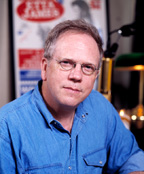
Nick Spitzer, American Routes Radio and Professor of Folklore and Cultural Conservation, University of New Orleans, LA
American Routes host and producer, Nick Spitzer is a folklorist specializing in American music and cultures of the Gulf South, with a long history of involvement in radio. Host, artistic director, and producer of the award-winning program Folk Masters (now on Smithsonian Folkways CDs), Spitzer is also a contributor of features on American music and culture to NPR's All Things Considered. In 1993, he initiated an annual American Roots 4th of July concert, broadcast live from the National Mall on NPR. As Louisiana State Folklorist (1978-85), he created films, festivals, exhibits and recordings of regional music, and co-produced a 90-minute Folk Festival USA special on Louisiana music for NPR, helping to bring Cajun music and zydeco to national visibility. His work continued at the Smithsonian Institution, where he curated folk festival programs and directed or served as commentator in films about American music including Great Performances, broadcast on PBS and the Discovery Channel. He has also served on the boards of the American Folklore Society, Fund for Folk Culture, and National Council for the Traditional Arts. Spitzer holds a doctorate in anthropology from the University of Texas, having done his research with African-French Louisiana Creoles and zydeco music. He is currently professor of folklore and cultural conservation at the University of New Orleans.
[ top ]
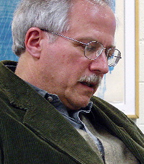
Jeff Todd Titon, Director of the Graduate Program in Ethnomusicology at Brown University
Jeff Todd Titon received the Ph.D. (in American Studies) from the University of Minnesota, where he studied ethnomusicology with Alan Kagan, writing his dissertation on blues music. A pioneer in applied ethnomusicology and the academic study of American vernacular music, he has published numerous books, articles, recordings, and films on the subject. From 1990-1995 he was editor of Ethnomusicology, the journal of the Society for Ethnomusicology. A Fellow of the American Folklore Society, he has been professor of music at Brown since 1986.
[ top ]

